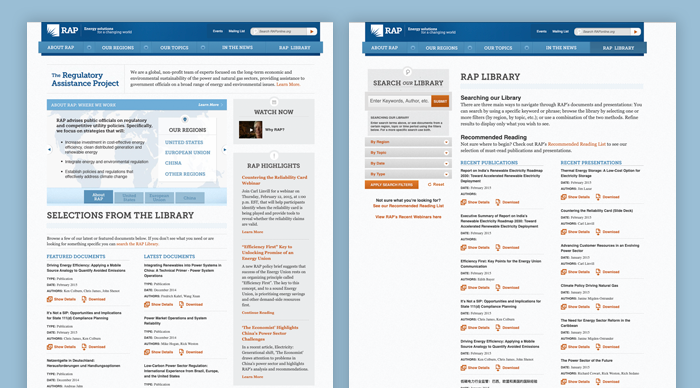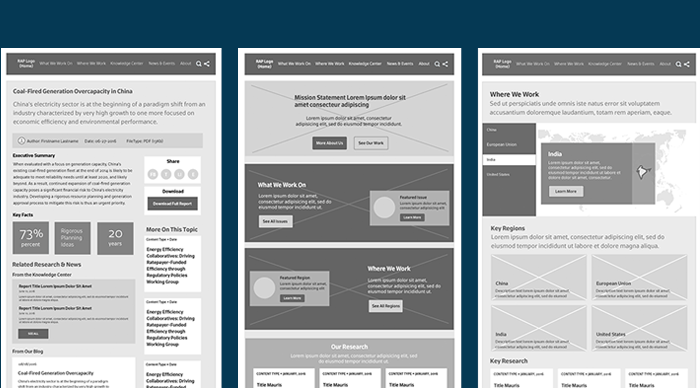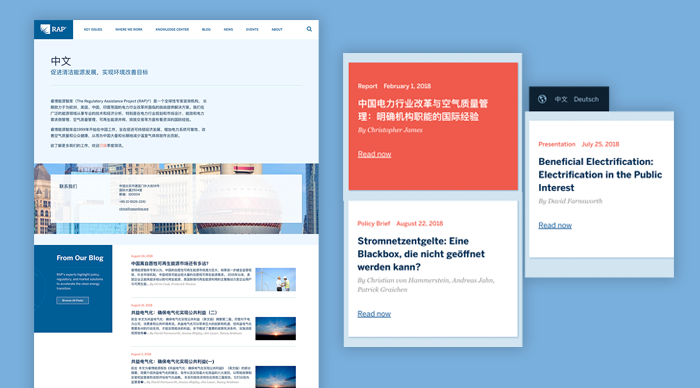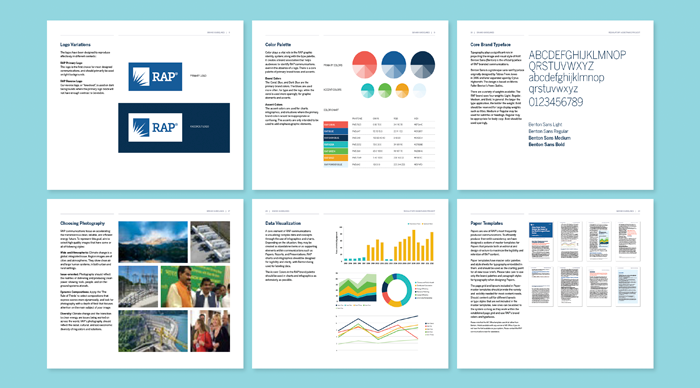The Regulatory Assistance Project (RAP) is a global coalition of specialized energy and regulatory experts who develop and support strategies that accelerate the world’s transition to a clean, reliable, and efficient energy future. Looking to strengthen their brand, and website, and deepen engagement across government and industry, RAP asked Constructive to develop integrated communications strategy to transform how they engage audiences online, in print, and at events. Together, we created a cross-media communications design system that helps RAP and stakeholders around the globe address the challenges across energy policy, regulation, and markets.
A Dense Website Making Insights Inaccessible
When RAP reached out to us, their website was loaded with incredible content. The problem was that it felt more like a stoic government archive than a website for an innovative global leader. Text-heavy pages were crammed with content, making it impossible to focus. A lack of imagery made RAP’s work feel theoretical and disconnected from the real world. And buried beneath all of RAP’s expert research was a story about who they were, what they do, and why it matters—if you could find it. The result was a website that failed to present RAP as the global leader they are, inspire audiences with their mission and impact, or make RAP’s valuable research accessible to their audience.
Connecting Audiences to Regulatory & Policy Expertise
RAP operates at the intersection of global energy regulatory policy, industry practices, and the environment—providing leadership and publishing research to reduce carbon emissions around the world. Their work is complex and their audiences are a cross-section of experts from across the private and public sectors, and the specialized press. Given the complexity and implications of RAP’s work, we developed content strategy that articulates RAP’s story, elevates their expertise, and explains the issues. UX design connects areas of expertise, geographic focus, and published research, giving users flexible pathways to explore based on their interests. To ensure RAP’s valuable research would be as accessible and useful to audiences, we conducted user research to identify goals and needs. The resulting UX design connects RAP’s history, expertise, and content to help industry, government, and the press both navigate and improve global energy regulatory policy.
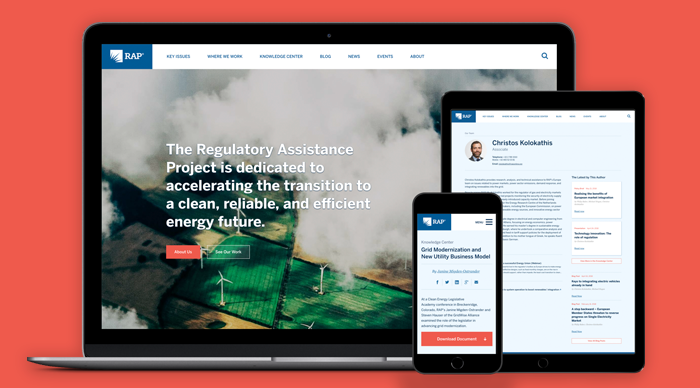
Designing for Global Credibility
RAP’s reach is impressive—they work with governments across the globe and the industry sectors that represent the totality of the energy production, storage, and delivery value chain. As a result, success depends on making sure that the organization’s research and perspective is seen as credible and valuable to a diverse, international audience. We designed a content-centric website that focuses on research and speaks using the classic “universal style.” The result is a brand experience that makes RAP’s research, policy analysis, and industry practices accessible; positioning them to increase influence around the world.
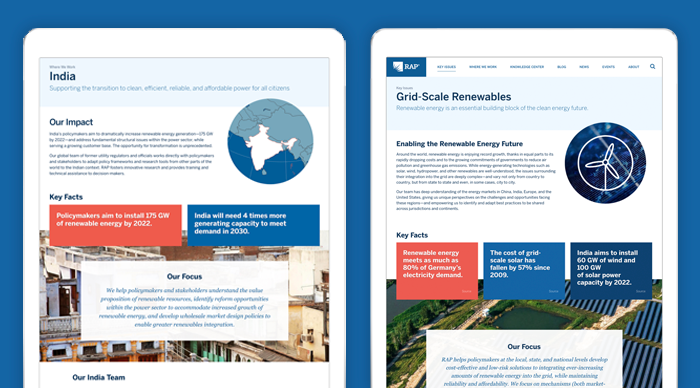
Providing Audiences with Global Insights
Energy issues and policies differ in every country—and RAP’s presence and expertise in key regions of the world is a core part of their mission strategy. To RAP’s reach and influence, regional hub pages educate audiences with narratives that highlight areas of focus and impact. Spotlights of RAP’s regional teams elevates expertise in navigating the challenges of local energy and regulatory issues. And region-specific research, analysis, and resources provide audiences with valuable content from RAP’s knowledge library.
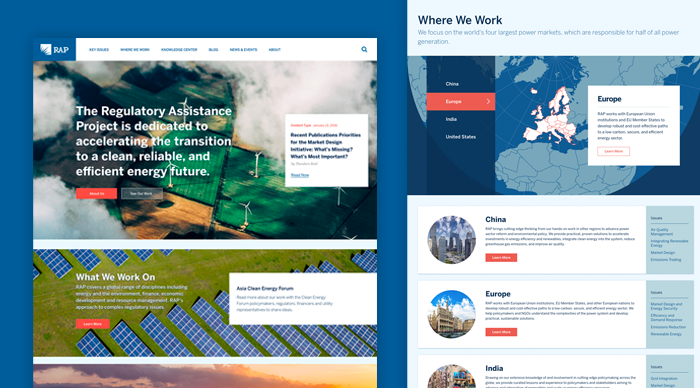
Focusing on Interconnected Climate, Public Health & Energy Issues
Energy is the biggest global industry sector and is inextricably tied to climate and public health issues. Not surprisingly, then, RAP’s expert research, analysis, and best practices reflect this complexity. To educate audiences and demonstrate RAP’s expertise, we developed an editorial content strategy that delivers top-level takeaways and a deeper understanding of the key issues. Quick takes, key statistics and facts, and a carefully designed editorial rhythm encourage exploration of RAP’s long-form content so that RAP can deliver clear perspective, actionable recommendations, and proven best practices that facilitate sector and market transitions to clean energy systems.
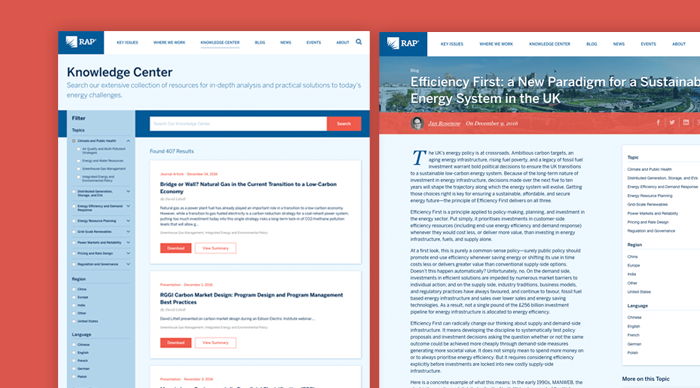
Making a World of Research Accessible
To maximize the value that RAP offers governments and the global energy sector, a robust Knowledge Center makes the organization’s research insights and expertise easily accessible. Advanced filtering lets audiences quickly locate research by topic, region, language, type, and date. And throughout the site experience, the website’s taxonomy system delivers related content—elevating reports, articles, presentations, and more based on each visitor’s interests.
A Fluent Multilingual User Experience
The universal design of RAP’s user experience visually addressed its global audience. And to engage leaders and gain traction in countries on four different continents, RAP’s content also needed to speak in a language people could easily understand. So, we designed a multilingual, multi-character set website that supports English, Mandarin, and German— with scalability to easily add new languages anytime.
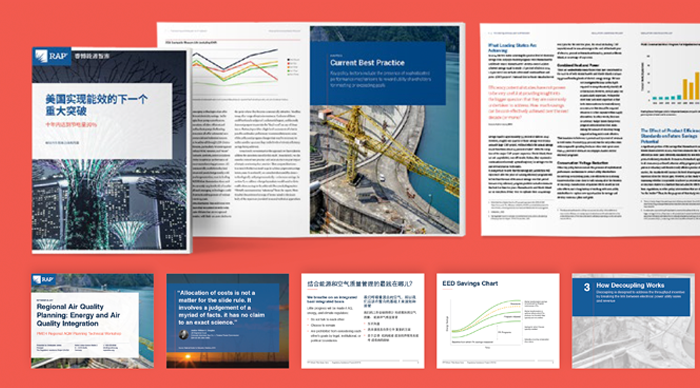
Research & Presentations That Resonate
Digital engagement is only one part of the equation in RAP’s formula for impact. Research reports and presentations at influential events are also an important component in the organization’s strategy to move to a clean energy future. As part of our redesign, we created a new communications design system for RAP’s team that increases the quality, impact, and influence of research by giving them the tools and templates they need to produce stand-out reports, issue briefs, and presentations and data visualizations.
A Communications Design System to Accelerate Systems Change
Once RAP’s new branding, website, and research communications design process was completed, we then formalized everything to make it sustainable. Comprehensive brand standards document the details of RAP’s new identity communications design system, providing specifications and guidance for the proper use of their logo, type, color, imagery, and data visualization. And a gallery of communications templates for reports, presentations and other communications makes it easy for staff to consistently produce high quality on-brand communications.
—————————
If you would like to explore a more visual case-study for our work with The Regulatory Assistance Project, click here.
If you’d like to explore more of Constructive’s work with climate & environment nonprofits, case studies are available here.




